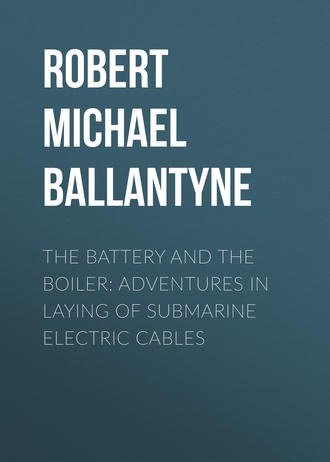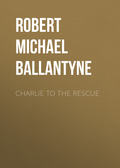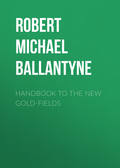
Robert Michael Ballantyne
The Battery and the Boiler: Adventures in Laying of Submarine Electric Cables
“Yes, yes, I can swim like a duck,” cried Robin, rising and staggering towards the bulwarks.
“But I can’t swim at all!” cried Stumps in a voice of horror.
Sam stopped as if suddenly paralysed. Then, laying hold of Robin, held him back. He felt, as he looked at the dark heaving sea and the now distant raft, that it was not possible for him and Slagg to save both their injured and their helpless comrade.
“Too late!” he said in a voice of despair, as he sat down and for a moment covered his face with his hands. Slagg looked at him with a bewildered rather than a despairing expression.
“So, we’ll have to sink together since we can’t swim together,” he said at last, with a touch of reckless vexation, as he gazed at the naturally stupid and by that time imbecile face of his friend Stumps.
“Come, only cowards give way to despair,” cried Sam, starting up. “We have one chance yet, God be praised, but let’s work with a will, boys, for the time is short.”
Chapter Fourteen.
The Raft
Sam Shipton’s one chance did not seem a bright one, but, with characteristic energy, he proceeded to avail himself of it at once.
When the raft was launched over the side, as described, the carpenters had embarked upon it with the rest of the ship’s crew, dropping their tools on the deck beside the mass of unused material of ropes, spars, planks, etcetera, as they left. Four of the spars were pretty equal in length. Sam selected them hastily and laid them on the deck in the form of a square, or oblong frame. Then he seized an axe.
“Unravel some of the ropes, Robin,” he cried. “You two select some planks as near ten feet long as possible. Quick—ask no questions, but do what I tell you.”
Sam Shipton was one of those who hold the opinion that every man born into the world, whether gentle or simple, should learn a trade. He had acted on his belief and taught himself that of a carpenter, so that he wielded the axe with skill, and gave his orders with the precision of one who knows what he is about. His comrades, although not trained to any special trade, were active handy fellows, with the exception, indeed, of John Shanks, whose fingers were usually described as “thumbs,” and whose general movements were clumsy; but Stumps had a redeeming quality to set against defects—he was willing.
With a few powerful well-directed blows, Sam cut four deep notches into the two longest of the selected spars, near their ends, at equal distances from each other. Into these he laid the ends of the two shorter spars, thus forming a frame-work.
“Twelve feet by ten, not a bad raft,” he muttered, as if to himself, while he snatched a rope from the bundle of those disentangled by Robin. “Take a rope of same size, you two, and lash the opposite corners as you see me doing. Stumps will go on selecting the planks.”
Sam jerked out his words with as much rapidity and force as he applied to the labour of his hands. There was something quite tremendous in his energy, and little wonder—for, as he glanced now and then along the deck he saw that the ship was rapidly settling down to her final dive, and that the closing scene would be sudden.
Powerfully impressed by his example, the others worked in total silence and with all their might, for Sam’s conduct, far more than the appearance of things, convinced them of their danger.
“The planks now, Stumps! Drive in as many of these clamps as you can find, Slagg—so,” (he set the example)—“we’ve no time to bore holes for bolts. A plank now; that’s it! Hand some nails—no, the biggest nails and the big hammer. Mind your fingers!”
Down came the heavy hammer on a four-inch nail, which went half through the thick plank. Two more such blows and the iron head was buried in the wood. Six planks sufficed to cover the frame. They were laid lengthwise with nails just sufficient to hold them. A piece of thick rope passed four times round the entire fabric still further secured them in position.
“Tie a lot of these nails in a bit of sail-cloth, Slagg, and fix ’em to the raft—to one of the spars, not the planks. Do the same with a saw, hammer, axe, and cask of biscuit,—water, too; don’t forget water. Make a belt of a bit of rope, Robin, and stick that small axe in it. Have it handy.”
While he spoke Sam did not look up, but gave all his attention to the tightening, with a hand-spike, of the knot on the thick rope that bound the raft together; for we may as well inform those who don’t know it, that the tying of a knot on a cable is not managed in the same way or with the same ease that a similar operation is performed on a piece of twine.
“But how shall we lift it over the side?” asked Stumps, becoming suddenly alive to a difficulty.
“Help me to haul on this rope and you shall see,” said Sam.
He ran to the side, lifted a coil of rope off its belaying-pin, threw it on the deck, cut the rope clear, and hauled it to the raft, to one end of which he made it fast.
It was the strong rope, by means of which one of the mizzen yards was braced, and was rove through a block attached to the outward end of the yard.
“Hoist away now—with a will!”
“Hold on,” cried Slagg, stuffing a mass of sail-cloth violently, by means of a hand-spike, underneath the binding rope of the raft.
“There now—yo ho! heave ho-o!”
Up went the end of the little ark of safety, and when one end was raised very little force was required to push it over.
“Hold on! hold on! hold o–o–on!” yelled Stumps, straining to prevent the raft from leaving the ship.
“No, no.—Let go! let go! let go-o-o!” roared Sam.
Stumps did let go and almost fell from the combined effect of his efforts and despair, as the raft swung off, splashed into the sea far out of reach, and hung half suspended from the yard-arm.
“It’s all up with us,” gasped Stumps.
“Not yet, but it will be all up with us in two minutes,” returned Sam, unable to repress a smile even at that moment.
“What d’ye mean?” said Stumps in amazement. “How can we ever git at it now?”
“Why, stoopid,” said Slagg, “don’t you see that we’ve only to go up the mast, out on the yard-arm, and slip down the rope.”
While he was speaking, Robin, by Sam’s orders, was performing the feat referred to.
“Look sharp!” he cried, turning to the others.
A heavy lurch of the ship caused their breasts to leap almost as fast as their bodies, for they were all more or less aware of the danger of the ship sinking before they could get clear of her. The darkness, too, was, as we have said, increasing by that time, though it was still light enough to enable them to see what they were about.
In a few minutes they all had gained the end of the yard-arm, slipped down the rope, and got upon the raft, but it was difficult to hold on, because at each heave of the ship, the fore-end of the raft was raised quite out of the sea, and then let fall with considerable violence. As soon as Sam reached it, he bade Robin cut adrift with his axe, so great was the heave; but at the moment the raft hung almost perpendicularly in the air, and Robin could do nothing but cling to the rope that bound it. Next instant it again fell flat on the sea.
“Now—cut!” cried Sam.
The rope was severed with one blow; almost at the same instant the stern of the Triton flew up with a degree of violence that no wave could account for. It was her last fling. Instantly after she went down head foremost. The masts, by good fortune, leaned away from the raft at the time, else they would have been struck by the yards, or involved in the rigging. As it was they did not escape. The vast whirlpool caused by the sinking ship drew them in with irresistible power. For one moment the horrified youths saw a dark green vortex towards which they rushed. Another moment, and they beheld a green funnel whirling round them as they sank into midnight darkness, while an ocean of roaring water filled their ears.
Who shall attempt to describe, the feelings or sensations of that moment! The one absorbing idea of self-preservation was of course dominant, coupled with an intolerable feeling that the upper air could never be regained.
It was reached, however, by all of them. First by Sam Shipton, who shot waist-high above the sea with a loud gasp, and struck out wildly. Then, recovering presence of mind, he swam more gently, and looked eagerly round. He was immediately followed by Robin and Slagg. Last of all by Stumps, who came up legs foremost, and, on turning other end up, saluted them with a roar that would not have shamed a monster of the deep. But the roar was cut short by a gurgle, as, in his frantic struggles, he sank himself again.
Observing this, and seeing that the others were comparatively self-possessed, Sam made towards his drowning comrade. The poor fellow, catching sight of him as he came near, made a clutch at him, but Sam was well aware of the danger of being grasped by a drowning man. He swerved aside, and Stumps sank with a gurgle of despair. Twice again did he rise and sink. Once more he rose. With a rapid stroke Sam swam behind him and caught him under the armpits. Violently did the poor fellow strive to turn round and clasp his preserver, but Sam, treading water, held him easily at arm’s-length with his head just above the surface. As long as he struggled nothing more could be done for him; Sam therefore put his mouth as near to his ear as possible and shouted:—
“Stop struggling!—else I’ll let you go!”
It was probably as much the tone of Sam’s voice as the sense of these words that calmed Stumps. At all events he instantly lay, or rather hung, perfectly limp and still.
“Now,” continued Sam, “you are quite safe if you do what I tell you. If you don’t you’re a dead man! D’you understand?”
“Yes,” gasped Stumps.
“Let your hands and arms lie flat on the water! Don’t try to raise your head farther than I let you! Keep your feet still! Let yourself hang helpless while I hold you and look round for the raft.”
It was obvious that Stumps had regained self-command, for as each of these orders was shouted in his ear, in the tones of a sergeant-major, he obeyed with eager, almost ludicrous, promptitude.
“The raft is here, close at hand,” said a voice close to Sam’s ear.
It was Robin who had discovered him at that moment.
“Is Slagg safe?” asked Sam.
“Here he is, all right,” said the worthy referred to, puffing and choking as he swam up.
“Keep off—don’t get in front of him,” said Sam, in a warning voice. “He mayn’t have recovered self-restraint enough yet to refrain from grasping you. Guide me to the raft, Robin, while I swim on my back, and see that you don’t let it hit me on the head when I come close. You and Slagg help each other on, and then help me with Stumps.”
Nothing could have calmed Stumps more than the cool, firm way in which these orders were given, so that he allowed himself to lie like a log while his deliverer drew him gently backwards until the back of his head rested on his bosom. Sam then struck out gently with his legs; Robin turned him with a push in the right direction, and thus, swimming on his back, he reached the raft. Slagg and Robin having already helped each other upon it, grasped his hair. At once he freed one hand and caught the rope that bound the raft. Stumps naturally slewed round, so that his mouth and nose went for a moment under water. Fancying that he was forsaken, he caught Sam round the neck, drew himself up, and gave a terrific yell.
“Ha! you may choke me now, if you can,” muttered Sam, as he grasped the rope with both hands, “only, the longer you hold on to me the longer you will be of getting out of the water.”
The terrified lad still retained sufficient sense to appreciate the force of the remark. Looking up as well as he could through his dishevelled hair, he held out one hand to Slagg, who grasped it firmly. Releasing Sam, with some hesitation he made a convulsive grasp at Robin with the other hand. Robin met him half-way. A loud “heave ho!” and a mighty pull brought him out of the sea, and sent him with a squash on the boards of the raft, where he lay gripping the ropes with his hands as with a vice.
Before his rescuers could turn to aid Sam, he stood panting beside them.
“Thank God,” said Sam, “for this deliverance!”
“Amen!” was the earnest and prompt response from the others.
Yet it seemed but a temporary deliverance, for when these castaways looked around them, they saw nothing but a heaving ocean and a darkening sky, with the tiny raft as the only visible solid speck in all the watery waste. Compared, however, with the extremity of danger though which they had just passed, the little platform on which they stood seemed to them an ample refuge—so greatly do circumstances alter our estimate of facts!
But they had not time to think much, as may be easily understood, for a great deal still remained to be done. Their little ark was by no means secure. We have said that only enough of nails had been driven into it to hold the planks to the frame-work, but not to withstand rough treatment. Indeed, during the plunge two of the planks had been torn off, but the binding rope held them to their places, as Sam had foreseen.
Very little daylight now remained, so that not a moment was to be lost.
“No sign of the big raft,” said Sam, stooping to unfasten the hammer and packet of nails, after taking one quick, anxious glance round the horizon.
“But it may be not far-off after all,” said Slagg, kneeling down to aid his comrade, while Stumps, by that time recovered, assisted Robin to tighten the ropes that held the pork-barrel. “With such poor light it ’ud be hard to make out a flat thing like that a-kickin’ in the hollows of the seas.”
“But you forget,” returned Sam, “that it must be a-kickin’ on the top o’ the sea as well as in the hollows. Another nail—thanks. However, I don’t expect to see it again.”
“Well, now, I expects to see it in the mornin’ not far-off,” said Slagg. “Is the water-cask fast, Robin?”
“All right—and the pork too.”
“And the sail. Just give it an extra shove under the ropes, Robin. We’d be badly off if we lost it.”
“I don’t see what good a sail can do us,” said Stumps, who had now quite recovered.
“Not as a sail, Stumpy,” replied Slagg, whose spirit soon recovered elasticity, “though even in that way it may help us, but as a blanket we shall appreciate it before long.”
Slagg was right. After the planking had been secured and the rope refastened, those unfortunates found themselves in an unenviable position. The gale had indeed abated somewhat, though the heaving of the great waves was little less tremendous, but the night had settled down into a state of pitchy darkness, so that they could barely see each other’s faces, while the seas continually washed over them, obliging them to hold on to the ropes for fear of being washed away.
In such circumstances sleep was out of the question, yet they stood sorely in need of rest.
“Now we’ll see what’s to be done wi’ the sail,” said Slagg, after they had been seated some time doing nothing. “Sleep I want, an’ sleep I’ll have, so lend a hand, boys.”
He drew out the sail with some trouble, so well had it been stuffed in, and bade the others hold and prevent it from flapping while he fastened the corners down. He did not arrange it like a tent, but spread it as flat as possible, doubling the superfluous edges inward, so that it presented little or no obstruction to the free passage of wind or water over them.
This done, they all crept underneath, and found it to be a much snugger den than they had expected, for the two casks prevented their heads from being pressed down when a few tons of water rolled over them—as occasionally happened.
Still they did not dare to sleep until each had fastened a rope round his waist and bound himself to the flooring. Having done so, each laid himself alongside of a turn of the binding-cable, and, embracing that affectionately with both arms, laid his head on the planks and shut his eyes.
Many and varied are the conditions under which healthy members of the human family seek and find repose, but we venture to think that few conditions have ever been found which were more unfavourable to sleep than that which has just been described.
Nevertheless, they were met promptly by slumber most profound, as they lay wet and weary on the little raft that disastrous night, on the dark and surging breast of the Southern Sea.
Chapter Fifteen.
Life on the Raft
To awake “all at sea”—in other words, ignorant of one’s locality—is a rather common experience, but to awaken both at and in the sea, in a similar state of oblivion, is not so common.
It was the fortune of Robin Wright to do so on the first morning after the day of the wreck.
At first, when he opened his eyes, he fancied, from the sound of water in his ears, that it must have come on to rain very heavily, but, being regardless of rain, he tried to fall asleep again. Then he felt as if there must be a leak in his berth somewhere, he was so wet; but, being sleepy, he shut his eyes, and tried to shut his senses against moisture. Not succeeding, he resolved to turn on his other side, but experienced a strange resistance to that effort. Waxing testy, he wrenched himself round, and in so doing kicked out somewhat impatiently. This, of course, woke him up to the real state of the case. It also awoke Slagg, who received the kick on his shins. He, delivering a cry of pain straight into Sam Shipton’s ear, caused that youth to fling out his fist, which fell on Stumps’s nose, and thus in rapid succession were the sleepers roused effectually to a full sense of their condition.
“It’s cold,” remarked Stumps, with chattering teeth.
“You should be thankful that you’re alive to feel the cold, you ungrateful creetur,” said Slagg.
“I am thankful, Jim,” returned the other humbly, as he sought to undo the rope that held him fast; “but you know a feller can scarcely express thanks or—or—otherwise half asleep, an’ his teeth goin’ like a pair o’ nut-crackers.”
“The wind is evidently down,” remarked Sam, who had already undone his lashings. “Here, Robin, help me to untie this corner of the sail. I had no idea that sleeping with one’s side in a pool of water would make one so cold and stiff.”
“If it had bin a pool, Mr Shipton,” said Slagg, “it wouldn’t have made you cold; ’cause why? you’d have made it warm. But it was the sea washin’ out and in fresh that kep’ the temperater low—d’ee see?”
“What a cargo o’ rheumatiz we’ve been a-layin’ in this night for old age,” said Stumps ruefully, as he rubbed his left shoulder.
Throwing off the sail, Sam stood up and looked round, while an exclamation of surprise and pleasure broke from him. The contrast between the night and morning was more than usually striking. Not only had darkness vanished and the wind gone down, but there was a dead calm which had changed the sea into a sheet of undulating glass, and the sun had just risen, flooding the sky with rosy light, and tipping the summit of each swell with gleaming gold. The gentle, noiseless heaving of the long swell, so far from breaking the rest of nature, rather deepened it by suggesting the soft breathings of slumber. There were a few gulls floating each on its own image, as if asleep, and one great albatross soared slowly in the bright sky, as if acting the part of sentinel over the resting sea.
“How glorious!” exclaimed Robin, as, with flashing eyes, he gazed round the scarce perceptible horizon.
“How hard to believe,” said Sam, in a low voice, “that we may have been brought here to die.”
“But surely you do not think our case so desperate?” said Robin.
“I hope it is not, but it may be so.”
“God forbid,” responded Robin earnestly.
As he spoke his arm pressed the little bible which he had rescued from the wreck. Thrusting his hand into his bosom he drew it out.
“Darling mother!” he said, “when she gave me this she told me to consult it daily, but especially in times of trouble or danger. I’ll look into it now, Sam.”
He opened the book, and, selecting the verse that first met his eye, read: “In all their affliction he was afflicted, and the angel of his presence saved them; in his love and in his pity he redeemed them; and he bare them and carried them all the days of old.”
“That’s a grand word for us, isn’t it?—from Isaiah,” said Robin.
“Well, what do you make of it?” asked Sam, whose religious education had not been attended to as well as that of his friend.
“That our God is full of love, and pity, and sympathy, so that we have nothing to fear,” said Robin.
“But surely you can’t regard that as a message to us when you know that you turned to it by mere chance,” said Sam.
“I do regard it as a special message to us,” returned Robin with decision.
“And what if you had turned up an entirely unsuitable or inapplicable verse?” said Sam.
“Then I should have concluded that God had no special message for us just now, but left us to that general comfort and instruction contained throughout the whole word. When, however, special comfort is sought and found, it seems to me ungrateful to refuse it.”
“But I don’t refuse it, Robin,” returned Sam; “I merely doubt whether it is sent to us or not.”
“Why, Sam, all the bible was sent to us for comfort and instruction.”
“True—true. I have not thought much on that subject, Robin, but I’ll try to believe at present that you are right, for we stand much in need of strong hope at all events. Here we are, none of us knows how far from the nearest land, with little food and less water, on a thing that the first stiff breeze may knock to pieces, without shelter and without compass!”
“Without shelter and compass, Mr Shipton!” said Jim Slagg, who had hitherto listened in silence to the conversation; “why, what d’ye call this?” (taking hold of the sail). “Ain’t that shelter enough, and won’t the sun guide us by day and the stars by night. It seems to me that you are too despondin’, Mr Shipton.”
“Don’t ‘mister’ me any more, Slagg. It was all very well aboard ship where we had our relative positions, but now we are comrades in distress, and must be on an equal footing.”
“Very good,” replied Slagg, looking round in his comrades’ faces, and raising his voice as if making a speech. “Bein’ equal, as you say, I takes the liberty o’ callin’ a general meetin’ o’ this free and—if I may be allowed the expression—easy Republic. Moreover, I move myself into the chair and second the motion, which, nobody objectin’, is carried unanimously. Gentlemen, the business of this here meetin’ is to appoint a commander to this here ship, an’ what could be more in accordance with the rule o’ three—not to mention the rules o’ four and common sense—than a Shipton takin’ command. Who’s goin’ to make the first reslootion?”
Entering into the spirit of the thing, Robin moved that Samuel Shipton be appointed to command the ship and the party, with the title of captain.
“And without pay,” suggested Slagg.
“And I move,” said Stumps, who was just beginning to understand the joke, though a little puzzled by the fact that it was done in earnest, “I move that Robin Wright be first leftenant.”
“Brayvo, Stumps!” cried Slagg, “your intellec’ is growin’. It on’y remains to appoint you ship’s monkey and maid-of-all-work—specially dirty work—and, then, with a hearty vote o’ thanks to myself for my conduct in the chair, to vacate the same an’ dissolve the meetin’.”
These matters having been satisfactorily settled, the castaways proceeded to prepare breakfast, and while this was being done the recently appointed captain looked once more anxiously round in the hope of seeing the large raft with their late shipmates on it, but it was not to be seen. Neither raft, ship, nor any other sign of man wos visible on all the glittering sea.
Breakfast was not a tempting meal. The biscuits were, indeed, as good as ship’s biscuits ever are, and when moistened with sea water formed a comparatively pleasant as well as strengthening food; but the barrel of pork was raw; they had no means of cooking it, and had not yet experienced those pangs of hunger which induce men to luxuriate in anything that will allay the craving. They therefore breakfasted chiefly on biscuit, merely making an attempt, with wry faces, to swallow a little pork.
Observing this, Sam said, in a half-jocular manner:—
“Now, my lads, it is quite clear to me that in taking command of this ship, my first duty is to point out the evils that will flow from unrestrained appetite for biscuit;—also to insist on the cultivation of a love for raw pork. You have no notion how good it is when fairly believed in. Anyhow you’ll have to try, for it won’t do to eat up all the biscuit, and have to feed at last on pure pork.”
“I calls it impure pork,” said Slagg; “hows’-ever, capting, you’ve on’y to give the word and we obey. P’r’aps the best way’ll be to put us on allowance.”
This suggestion was at once acted on, and a considerable part of that bright day was spent by Sam and Robin in calculating how much pork should go to a biscuit, so that they should diminish in an equal ratio, and how much of both it would be safe to allow to each man per diem, seeing that they might be many days, perhaps even weeks, at sea. While the “officers” were thus engaged, Slagg and his friend Stumps busied themselves in making a mast and yard out of one of the planks—split in two for the purpose—and fitting part of their sail to the same.
Evening found them with the work done, a small sail hoisted on the rude mast, the remaining part of the canvas fitted more securely as a covering, and the apportioned meal before them. But the sail hung idly from its yard and flapped gently to and fro as the little ark rose and sank on the swell, for the calm still prevailed and the gorgeous sunset, with its golden clouds and bright blue sky, was so faithfully reflected in the sea, that they seemed to be floating in the centre of a crystal ball which had been dipped in the rainbow.
When night descended, the scene was, if possible, still more impressive, for although the bright colours had vanished, the castaways still floated in the centre of a dark crystal universe, whose unutterable depths were radiant with stars of varied size and hue.
Long they sat and gazed in solemn admiration at the scene, talking in subdued tones of past, present, and future, until their eyes refused to do their office and the heavy lids began to droop. Then, reluctantly, they crept beneath the sail-cloth covering and lay down to rest.
The planks were hard, no doubt, but our castaways were hardy; besides, a few folds of the superfluous portions of the large sail helped to soften the planks here and there.
“Now, boys,” said Slagg, as he settled himself with a long-drawn sigh, “the on’y thing we wants to make us perfectly happy is a submarine telegraph cable ’tween this an’ England, to let us say good-night to our friend, ashore, an’ hope they won’t be long in sending out to search for us.”
It is sad to be obliged to record that, Slagg’s companions being already asleep, this tremendous and original piece of pleasantry was literally cast upon the waters, where it probably made no impression whatever on the inhabitants of the slumbering sea.







